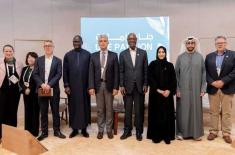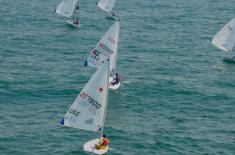
- Home
- Pakistan
- Neglected community along expressway pleads to turn wasted greenbelt into a public lifeline
Neglected Community Along Expressway Pleads To Turn Wasted Greenbelt Into A Public Lifeline
Fahad Shabbir (@FahadShabbir) Published October 19, 2025 | 03:00 PM

ISLAMABAD, (UrduPoint / Pakistan Point News - 19th Oct, 2025) Surrounded by traffic and trapped in a sea of concrete, communities living along the Islamabad Expressway, from Faizabad to Khanna Pul, are raising a simple yet urgent demand: turn the long-unused greenbelt into a safe, accessible public space.
Originally meant as a natural buffer, this strip has become a symbol of neglect — overgrown, littered, and forgotten. Yet residents believe it holds the potential to be a lifeline: a place for walking tracks, children’s play areas, and greenery that supports both physical and mental well-being in a city rapidly losing its breathing spaces.
Voices From the Greenbelt
On a battered bench between the noisy Expressway and the streets of Iqbal Town, Salma from Shakrial sits with her two children. Their two-room home is dark and damp, so she brings them out for fresh air.
“My children are like flowers. Without fresh air and the morning dew, they are withering away,” she says softly talking to APP.
The children laugh as they slide down the only working slide — until their play is interrupted. A taped tennis ball, hit hard by older boys playing cricket, strikes seven-year-old Zainab.
This single ruined patch is all they have. Women, toddlers, and boys share it — playing, sitting in the dust, dodging cricket balls. People throw garbage here too, making it dirty and unsafe.
Ehsan, who came at his daughter Aqsa’s request, told APP:
“The parking mafia and building material dealers are taking over this place too. Even this little space is shrinking for us. When I take my daughter back home, she will be covered in dust.”
Bilal agrees:
“We have no other place to bring our kids on weekends. From Faizabad to Khanna Pul there is a wide strip of land. If it were leveled and grass planted, families could spend a few peaceful hours.”
Bashira Bibi, her cheeks red from the sun, says:
“Only two slides remain. The swings and benches are broken or stolen. If someone damages anything, nobody stops them.”
Muhammad Saleh, 11, says:
“There are holes everywhere, dust and stones all around. Three or four cricket teams play at once, and their balls keep hitting us. But we have no choice?” he told APP,.
Former councillor Shah Nawaz explains:
“We tried to improve the space with local effort. A few swings were installed, but without money for a boundary wall or proper equipment, nothing lasted. Now this wide strip from Faizabad to Khanna Pul is being grabbed by mafia or turned into graveyards. With just a little attention, this could become a safe space for thousands of residents.”
Mudassir, a college student, admits:
“We know women and children are disturbed by our cricket balls, but tell us where else can we go? Artificial turf grounds in the city charge by the hour. We cannot afford them.”
Another boy, Mehboob, adds:
“The space is here. If a portion was set aside for us, we could play in peace.”
Old Jamila Bibi, walking with a stick, says:
“I spent my life in open fields in the village. Now I come here hoping for fresh air, but the dust and the cricket balls push me to the edge. If there was grass, I could sit in comfort even for a while.”
On the Islamabad side — from Dhoke Kala Khan to Zia Mosque — the need is the same. Sitting on a patch of wild grass near the mosque, Asim says:
“We have no park or open ground. Our cramped homes force us to sit here among pits and garbage.”
What This Could Be
This long, wasted greenbelt — touching Iqbal Town, Murshid Town, Khanna Kak, Shakrial, Madina Town, Aliabad, Raja Shafiq-ur-Rehman Town in Rawalpindi, and the Zia Mosque strip in Islamabad — could become a true lifeline. Instead, it remains a dusty wasteland where families search for peace among broken swings, flying cricket balls, and garbage heaps.
Why It Matters
Health and Relief: Parks improve air quality, reduce dust and heat, and offer space to walk, sit, and breathe.
For Children and Families: Kids need space to play. Women and elders need safe, calm places to relax. Without these, crowded homes become suffocating.
Global Standards: The WHO recommends at least 9 m² of green space per person.
Local Reality: In Pakistani cities, green space falls far below this. Experts suggest 20–25% of urban land should be green — yet many Rawalpindi neighborhoods have none, even where land lies idle.
Recent Stories

MoFA advances multilateral water cooperation at IUCN Congress events ahead of 20 ..

Impressive results for Abu Dhabi Sailing Team on day one of Mussanah Sailing Wee ..

Dubai International Chamber launches its first Eastern Europe representative off ..

Creators Ventures Accelerator programme attracts 1,131 applicants from 70 countr ..

UAE strengthens global leadership in cloud investments, data centre projects

TRENDS symposium analyses role of AI in regulatory systems

Currency Rate In Pakistan - Dollar, Euro, Pound, Riyal Rates On 19 October 2025

Today Gold Rate in Pakistan 19 October 2025

Al Ain, Al Wasl, Khorfakkan, Al Jazira lead in ADNOC Pro League

UoS, UAE Scouts launch global JOTA-JOTI camp

Cairo to host International Conference for Early Recovery & Reconstruction of Ga ..

Premier League: Manchester City beat Everton 2-0
More Stories From Pakistan
-
Neglected community along expressway pleads to turn wasted greenbelt into a public lifeline
7 minutes ago -
PO held after encounter
7 minutes ago -
Rickshaw driver killed in road accident
17 minutes ago -
Ayaz welcomes ceasefire agreement between Pakistan-Afghanistan
17 minutes ago -
Immigration, a pathway for talent, knowledge exchange, not mere relocation: Expert Abu Bakar Adil
26 minutes ago -
District administration intensifies cleanliness, inspection operations in Lakki Marwat
27 minutes ago
-
Ayaz felicitates SUPARCO scientists, engineers on successful launch of HS-1
27 minutes ago -
Chairman SUPARCO thanks govt, praises Pakistan-China teams for HS-1 satellite success
27 minutes ago -
ICT Police recover stolen Prado worth 10 miln
27 minutes ago -
Saving Dir’s blade legacy: Artisans await CM Sohail Afridi’s support
37 minutes ago -
Sindh Governor, CM felicitate on launch of Pakistan’s 1st hyperspectral satellite
37 minutes ago -
Nation pays tribute to veteran actor Saleem Nasir on 36th death anniversary
2 hours ago